Resume
Geriatrician Cover Letter Examples

May 29, 2025
|
12 min read
Craft a compelling geriatrician cover letter that earns you a standing ovation from potential employers. Discover key strategies to showcase your skills, experiences, and passion for elderly care while adding your personal touch to make it unforgettable.
4.70 Average rating
Rated by 348 people
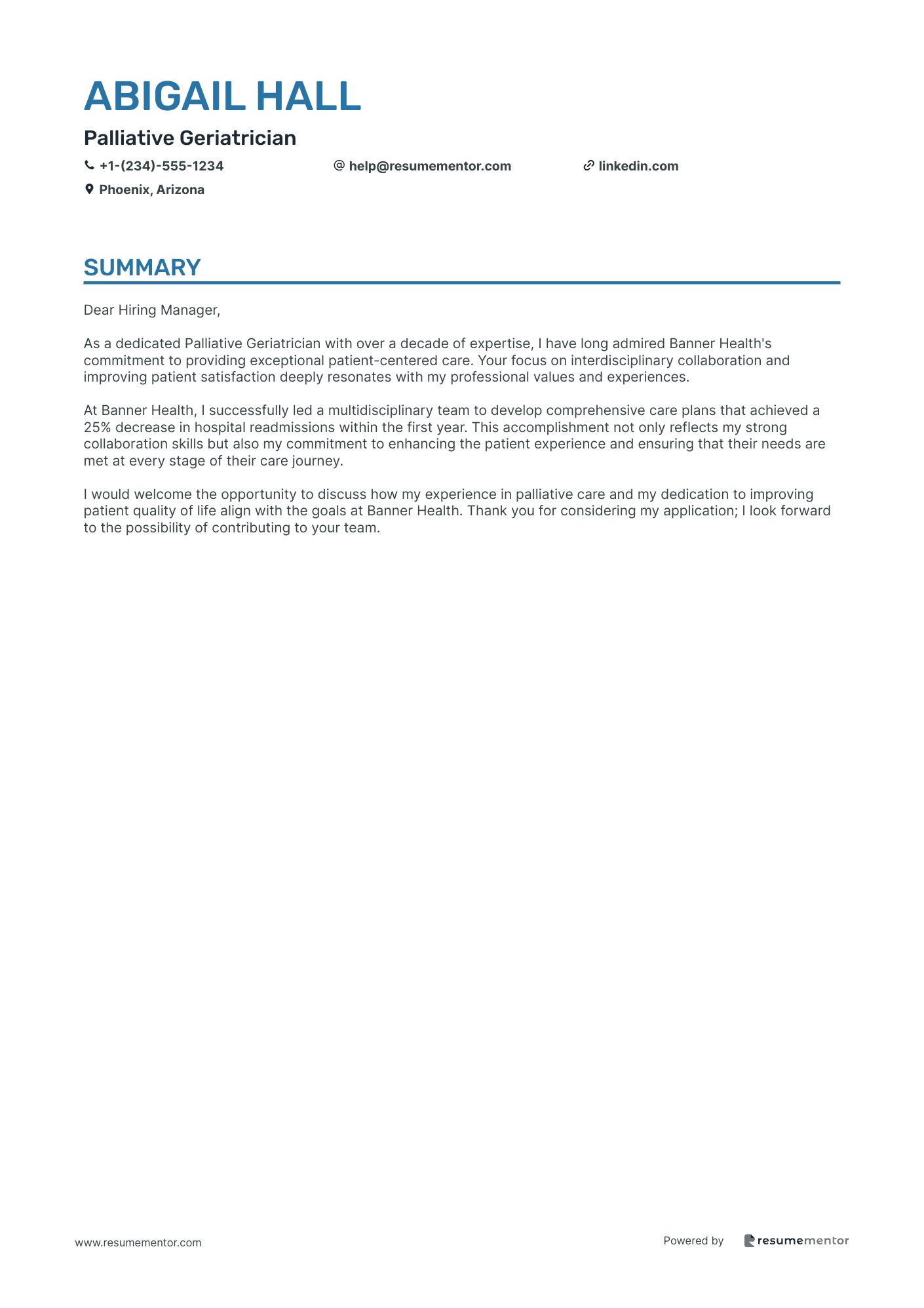
Palliative Geriatrician
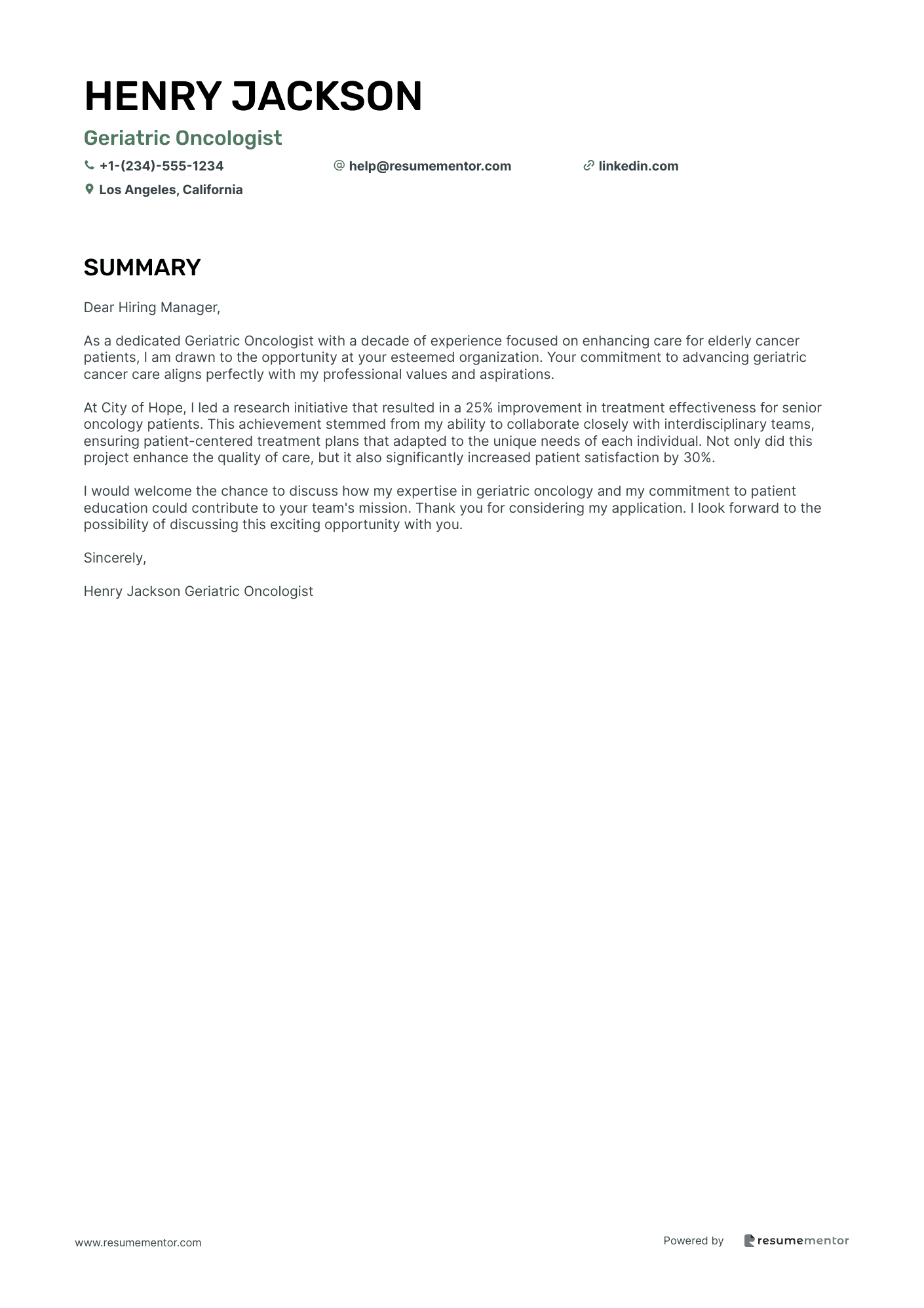
Geriatric Oncologist
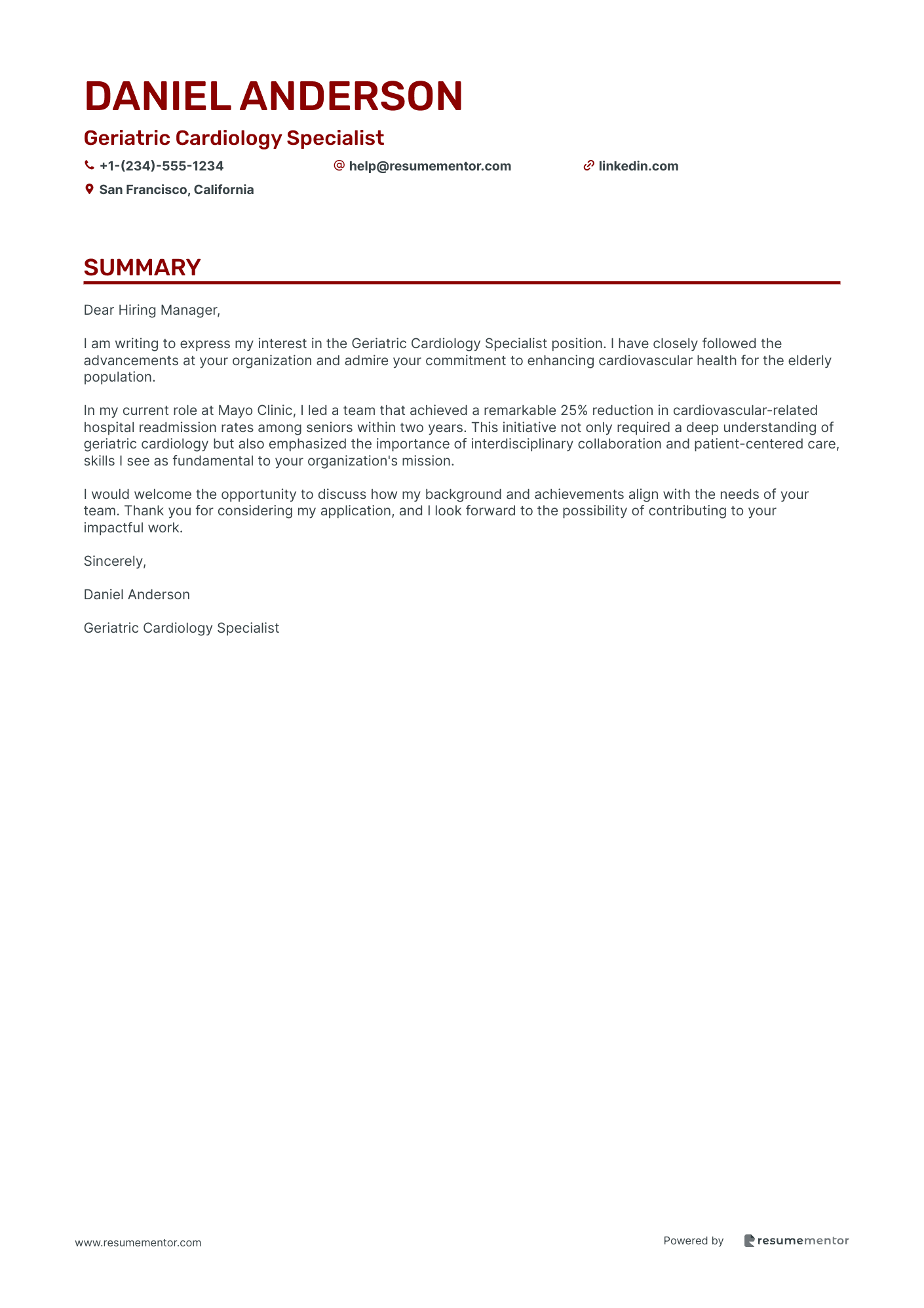
Geriatric Cardiology Specialist
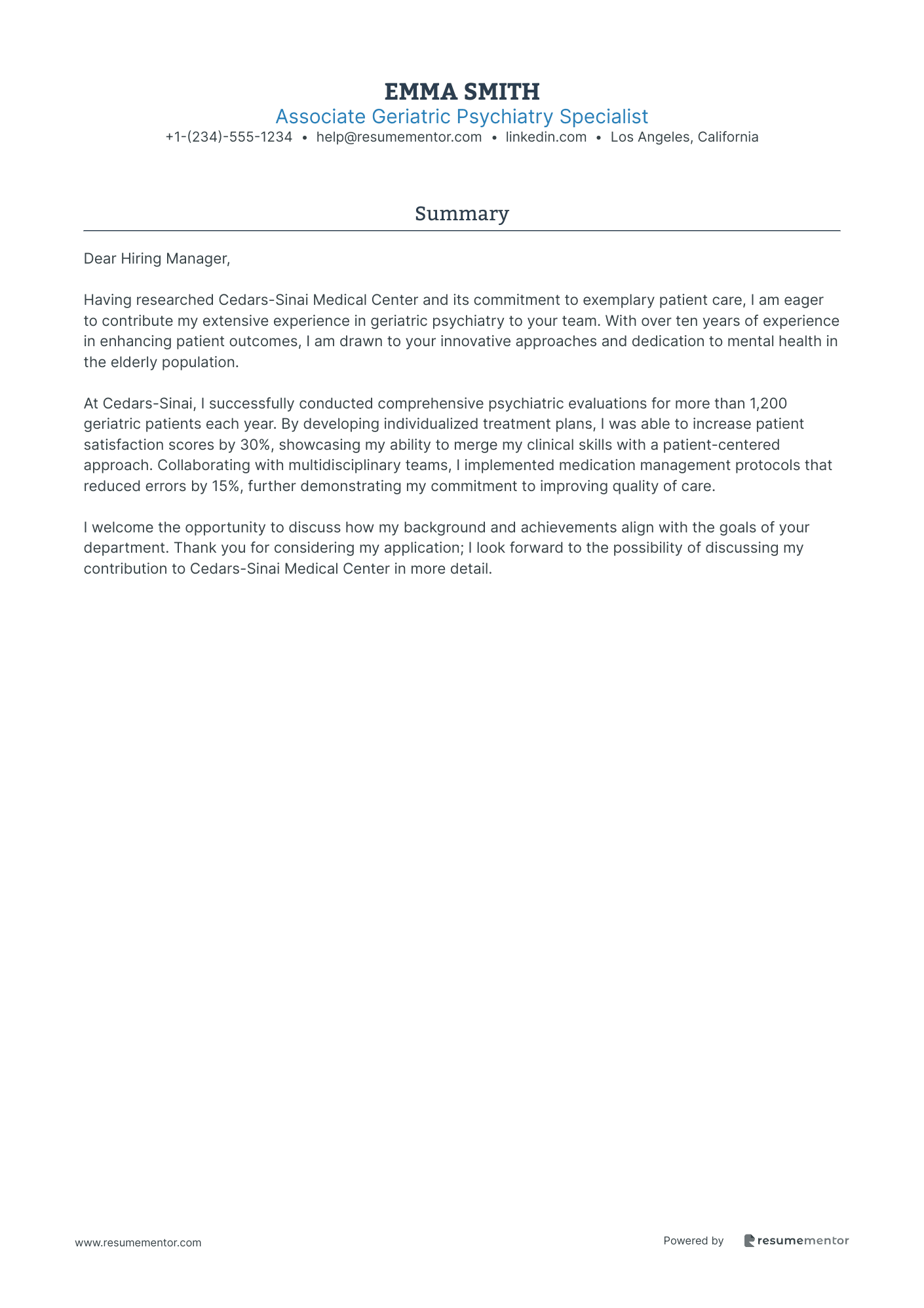
Associate Geriatric Psychiatry Specialist
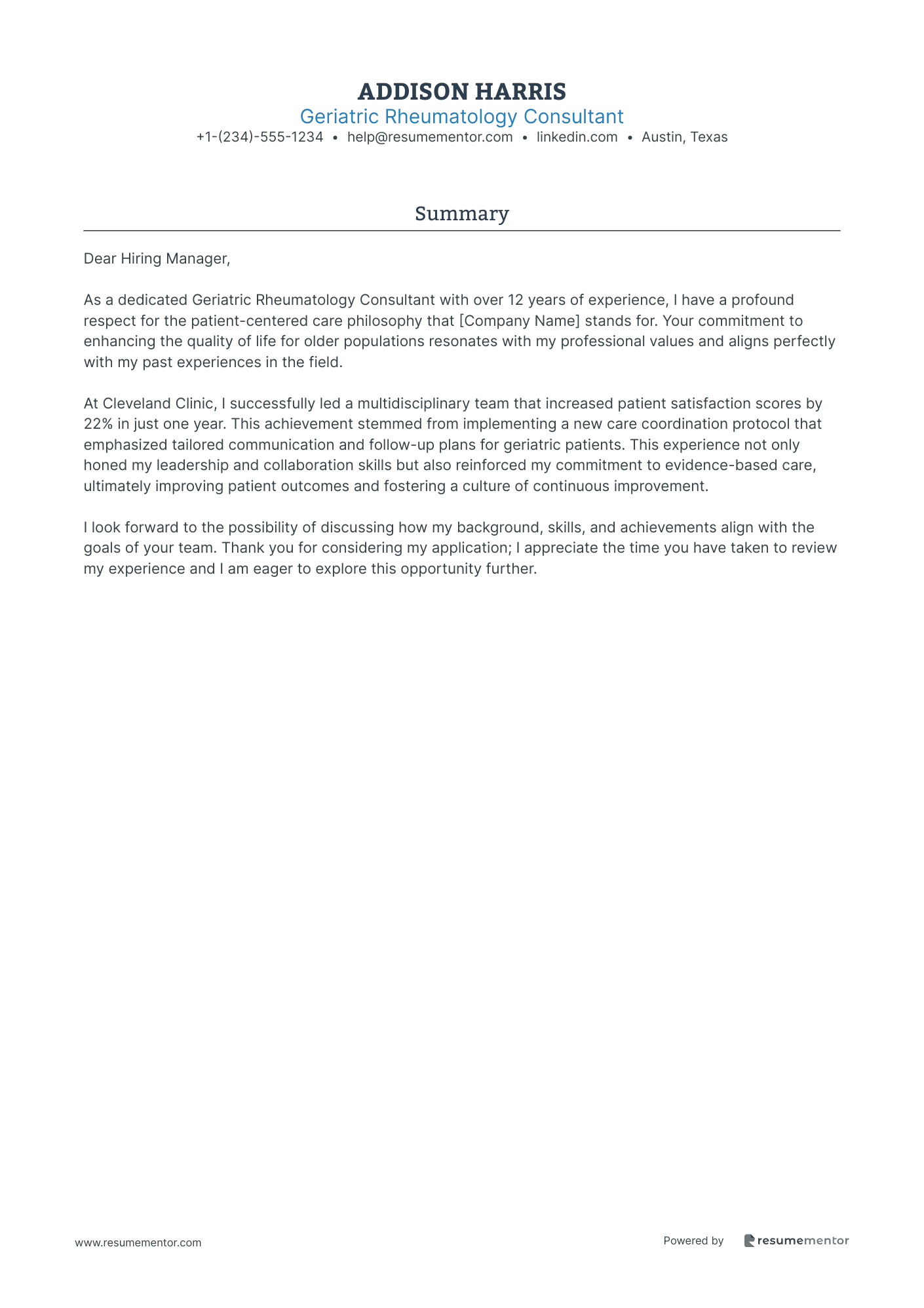
Geriatric Rheumatology Consultant
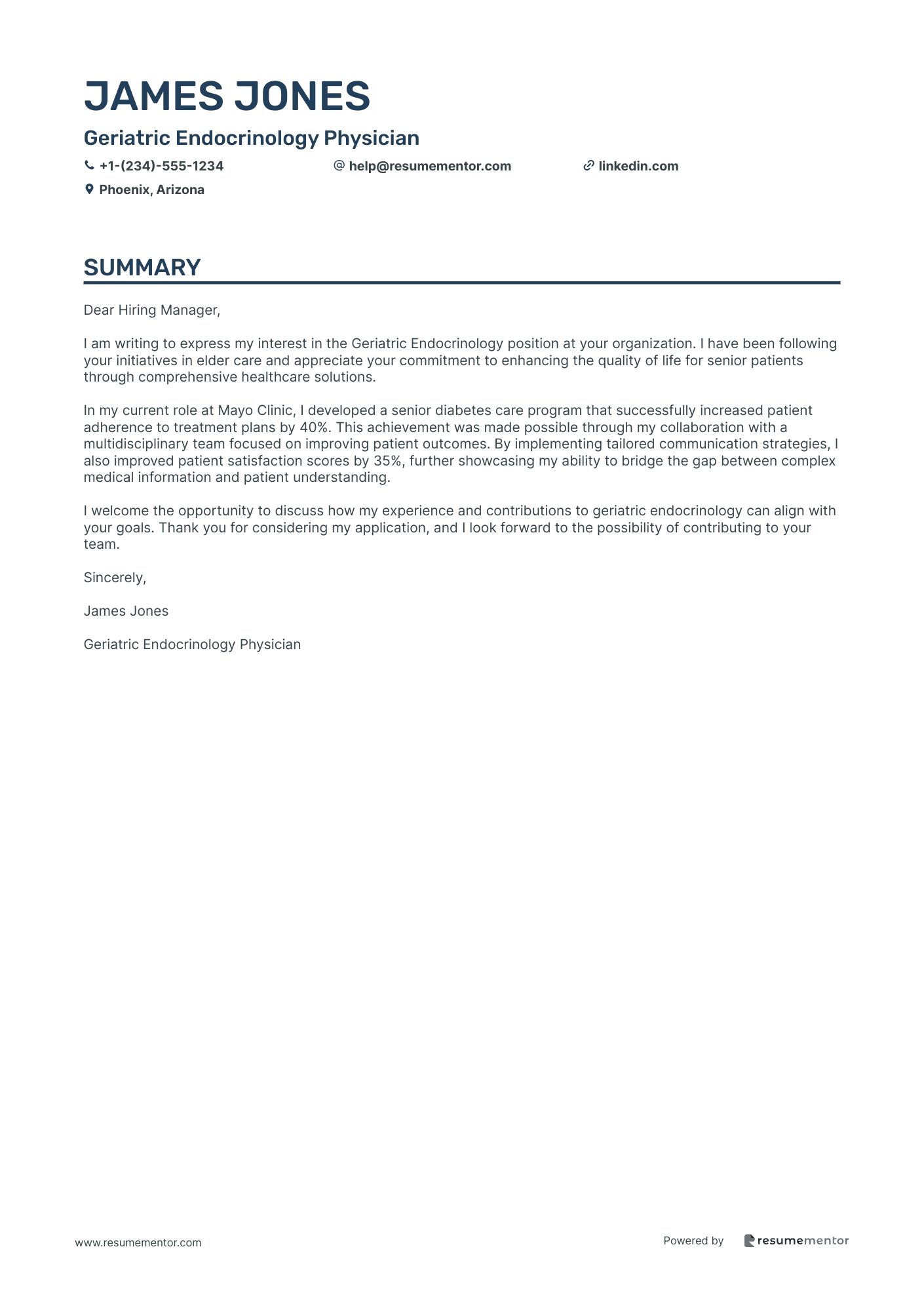
Geriatric Endocrinology Physician
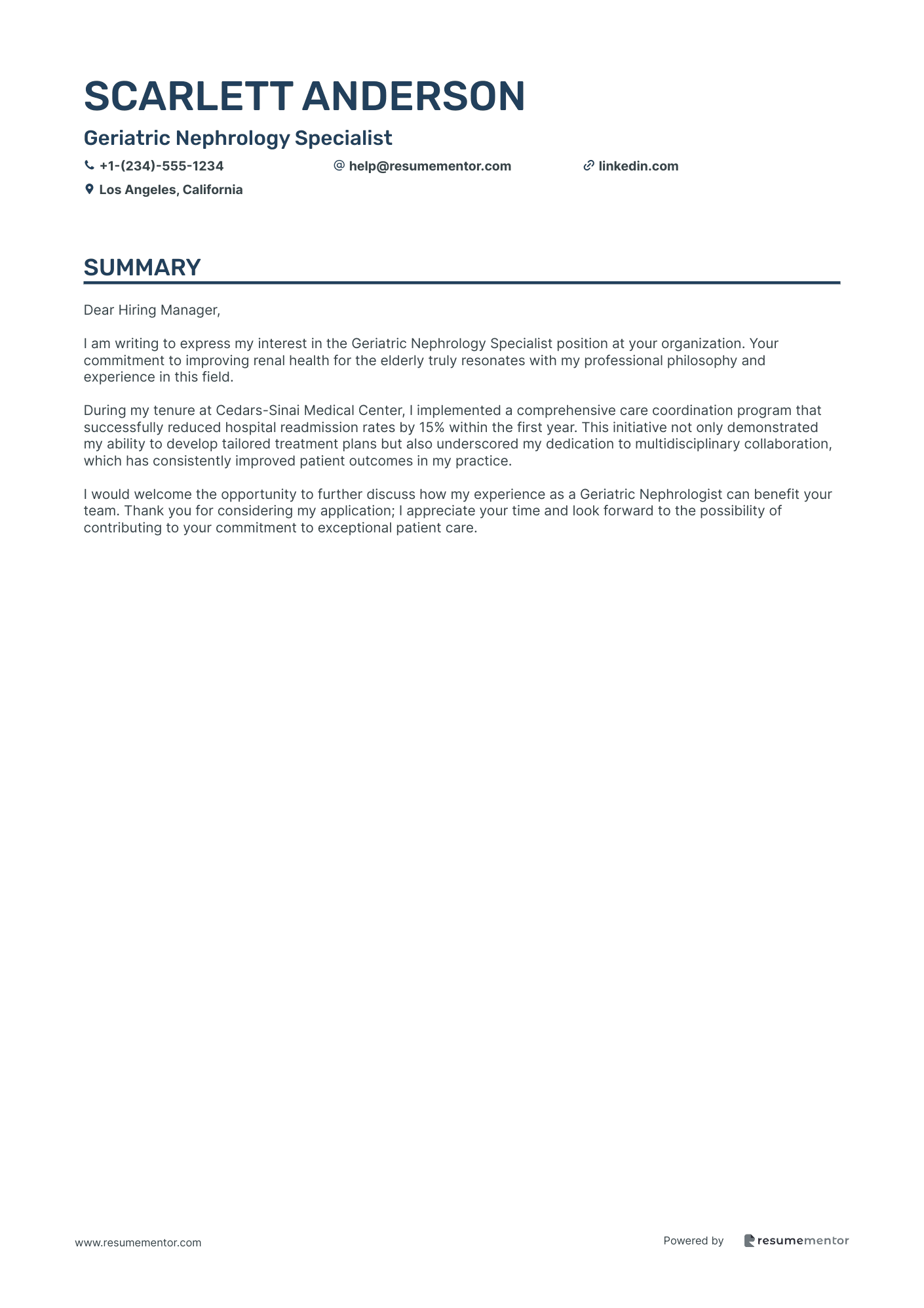
Geriatric Nephrology Specialist
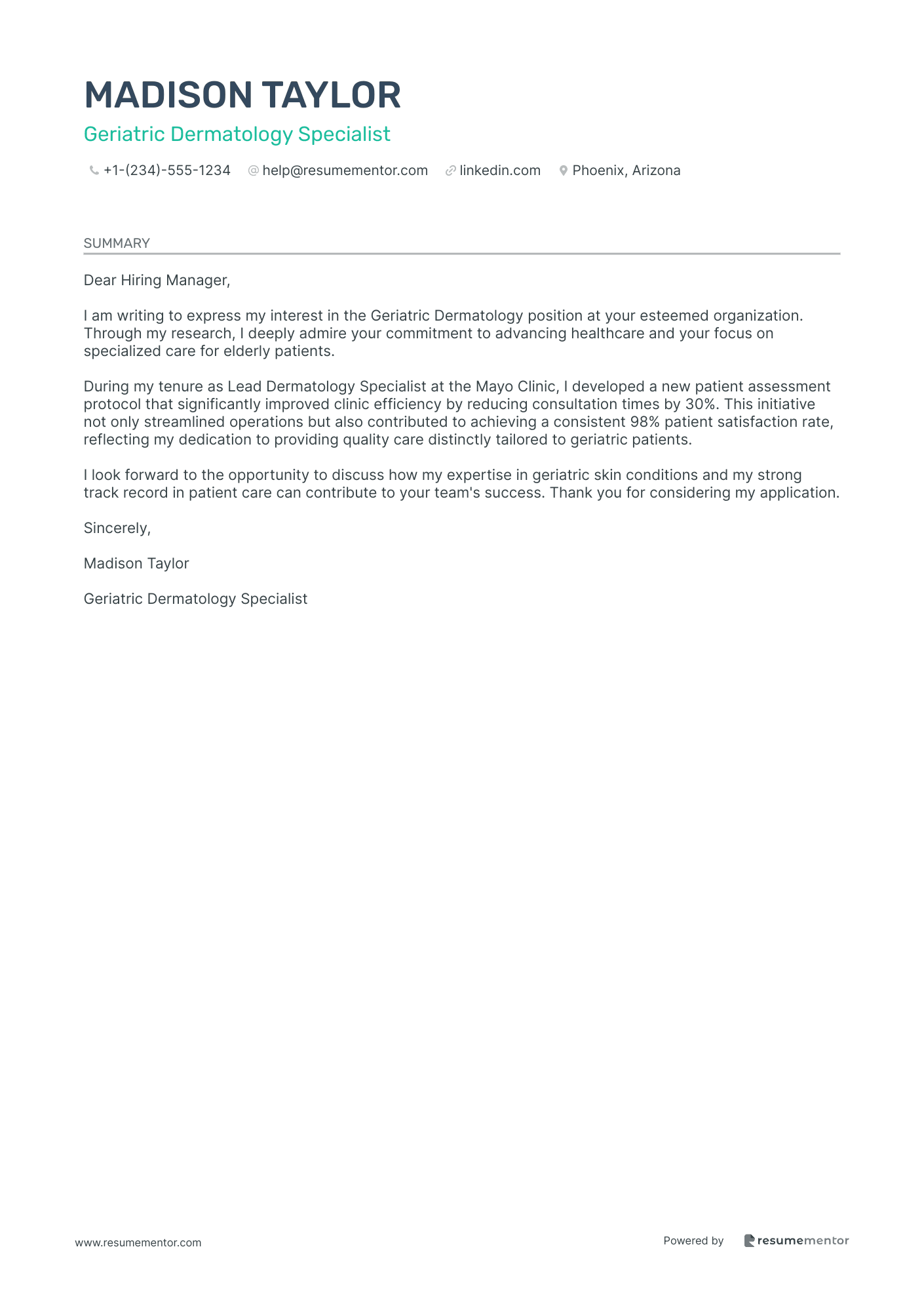
Geriatric Dermatology Specialist
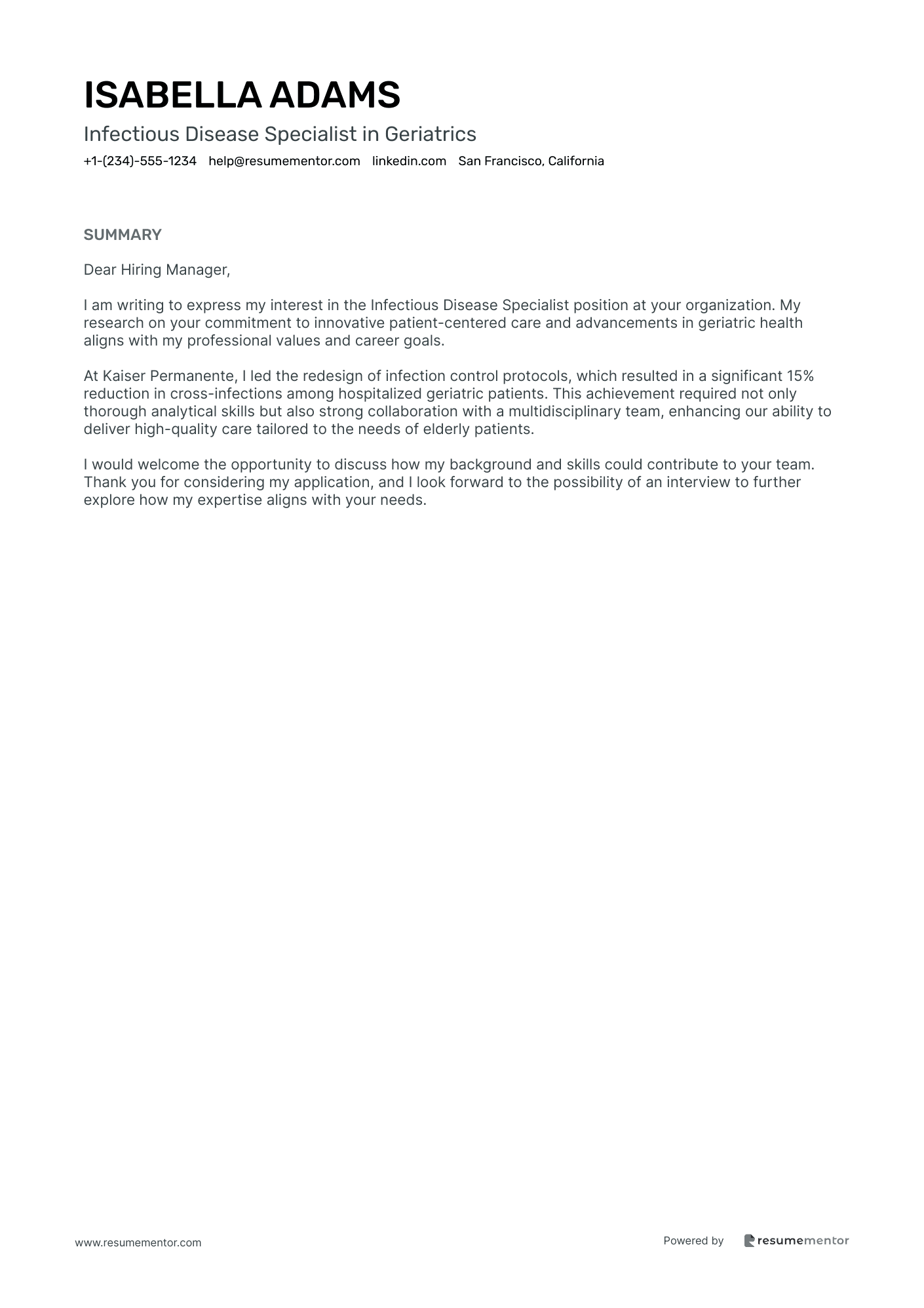
Infectious Disease Specialist in Geriatrics
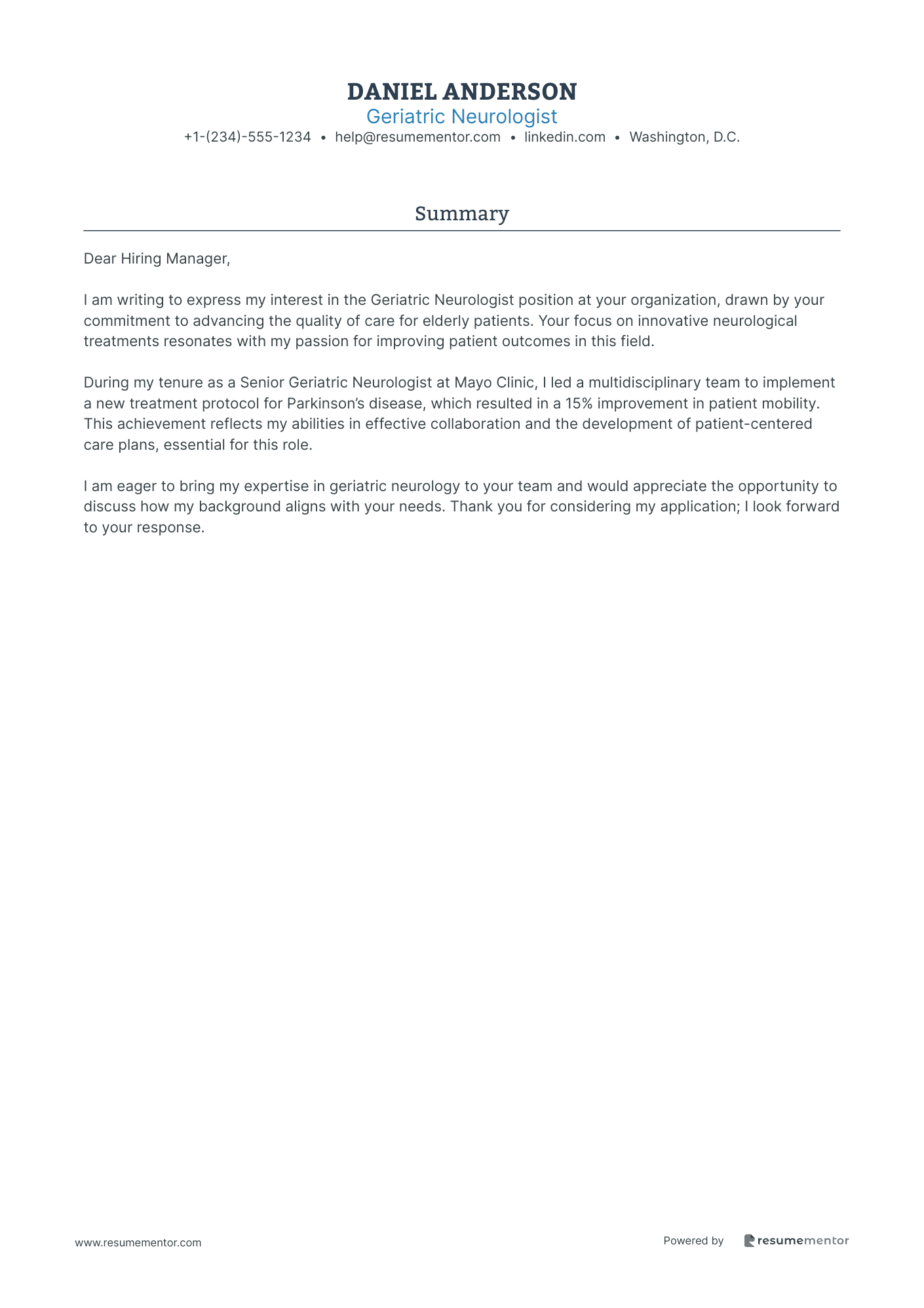
Geriatric Neurologist

Palliative Geriatrician cover letter sample
When crafting your cover letter, emphasize your clinical experience in geriatrics and your understanding of chronic illness management. Highlight any training in palliative care and patient communication skills. Include any specialized certifications, such as in pain management or end-of-life care, to demonstrate your commitment. Use specific examples of how your approach has improved patient comfort and family satisfaction. Focus on collaboration with multidisciplinary teams and mention any contributions you made to care plans that resulted in better patient outcomes, citing real-world impacts whenever possible.
Abigail Hall
Palliative Geriatrician
Summary
Dear Hiring Manager,
As a dedicated Palliative Geriatrician with over a decade of expertise, I have long admired Banner Health's commitment to providing exceptional patient-centered care. Your focus on interdisciplinary collaboration and improving patient satisfaction deeply resonates with my professional values and experiences.
At Banner Health, I successfully led a multidisciplinary team to develop comprehensive care plans that achieved a 25% decrease in hospital readmissions within the first year. This accomplishment not only reflects my strong collaboration skills but also my commitment to enhancing the patient experience and ensuring that their needs are met at every stage of their care journey.
I would welcome the opportunity to discuss how my experience in palliative care and my dedication to improving patient quality of life align with the goals at Banner Health. Thank you for considering my application; I look forward to the possibility of contributing to your team.
Geriatric Oncologist cover letter sample
When applying for this specialized role, emphasize your experience in geriatrics, oncology, and palliative care. Highlight any research projects or clinical trials you've participated in, especially those focusing on older adults. It's crucial to showcase your ability to communicate complex diagnoses clearly and compassionately. Include participation in multidisciplinary teams; examples of collaboration improve your candidacy. If you have certifications relevant to geriatric care or oncology, mention them. Share instances where your approach significantly improved patient outcomes, demonstrating your commitment to this patient population.
Henry Jackson
Geriatric Oncologist
Summary
Dear Hiring Manager,
As a dedicated Geriatric Oncologist with a decade of experience focused on enhancing care for elderly cancer patients, I am drawn to the opportunity at your esteemed organization. Your commitment to advancing geriatric cancer care aligns perfectly with my professional values and aspirations.
At City of Hope, I led a research initiative that resulted in a 25% improvement in treatment effectiveness for senior oncology patients. This achievement stemmed from my ability to collaborate closely with interdisciplinary teams, ensuring patient-centered treatment plans that adapted to the unique needs of each individual. Not only did this project enhance the quality of care, but it also significantly increased patient satisfaction by 30%.
I would welcome the chance to discuss how my expertise in geriatric oncology and my commitment to patient education could contribute to your team's mission. Thank you for considering my application. I look forward to the possibility of discussing this exciting opportunity with you.
Sincerely,
Henry Jackson Geriatric Oncologist
Geriatric Cardiology Specialist cover letter sample
When preparing your cover letter, emphasize any specialized training in geriatrics or cardiology. Highlight your experience with age-related cardiac conditions and your ability to manage complex cases. If you've participated in research or have published articles on topics like heart health in older adults, include these accomplishments. Mention any certifications or continuous education in geriatric care, as this demonstrates your commitment. Share specific examples of how your interventions improved patient outcomes, following a clear 'skill-action-result' format to illustrate your effectiveness in this field.
Daniel Anderson
Geriatric Cardiology Specialist
Summary
Dear Hiring Manager,
I am writing to express my interest in the Geriatric Cardiology Specialist position. I have closely followed the advancements at your organization and admire your commitment to enhancing cardiovascular health for the elderly population.
In my current role at Mayo Clinic, I led a team that achieved a remarkable 25% reduction in cardiovascular-related hospital readmission rates among seniors within two years. This initiative not only required a deep understanding of geriatric cardiology but also emphasized the importance of interdisciplinary collaboration and patient-centered care, skills I see as fundamental to your organization's mission.
I would welcome the opportunity to discuss how my background and achievements align with the needs of your team. Thank you for considering my application, and I look forward to the possibility of contributing to your impactful work.
Sincerely,
Daniel Anderson
Geriatric Cardiology Specialist
Associate Geriatric Psychiatry Specialist cover letter sample
When applying for this role, it is important to highlight any clinical experience with elderly patients. Emphasize your understanding of age-related mental health issues and any relevant training in geriatric care. Include specific certifications such as 'Geriatric Psychiatry Essentials' or 'Mental Health for Seniors'. Use real examples that demonstrate your empathy and teamwork in a clinical setting. Following a 'skill-action-result' format, show how your expertise has positively impacted patient outcomes or enhanced care quality in your previous positions.
Emma Smith
Associate Geriatric Psychiatry Specialist
Summary
Dear Hiring Manager,
Having researched Cedars-Sinai Medical Center and its commitment to exemplary patient care, I am eager to contribute my extensive experience in geriatric psychiatry to your team. With over ten years of experience in enhancing patient outcomes, I am drawn to your innovative approaches and dedication to mental health in the elderly population.
At Cedars-Sinai, I successfully conducted comprehensive psychiatric evaluations for more than 1,200 geriatric patients each year. By developing individualized treatment plans, I was able to increase patient satisfaction scores by 30%, showcasing my ability to merge my clinical skills with a patient-centered approach. Collaborating with multidisciplinary teams, I implemented medication management protocols that reduced errors by 15%, further demonstrating my commitment to improving quality of care.
I welcome the opportunity to discuss how my background and achievements align with the goals of your department. Thank you for considering my application; I look forward to the possibility of discussing my contribution to Cedars-Sinai Medical Center in more detail.
Geriatric Rheumatology Consultant cover letter sample
When applying for this position, it’s essential to highlight any experience with elderly patients, particularly in managing chronic conditions. Showcase familiarity with treatment protocols specific to aging populations. Evidence of successful interdisciplinary collaboration is critical, so mention any teamwork with physical therapists or primary care physicians. If you have pursued relevant training, such as courses in geriatrics or pain management, include these details. Use examples that demonstrate how your insights led to improved patient outcomes, emphasizing a 'skill-action-result' format for clarity.
Addison Harris
Geriatric Rheumatology Consultant
Summary
Dear Hiring Manager,
As a dedicated Geriatric Rheumatology Consultant with over 12 years of experience, I have a profound respect for the patient-centered care philosophy that [Company Name] stands for. Your commitment to enhancing the quality of life for older populations resonates with my professional values and aligns perfectly with my past experiences in the field.
At Cleveland Clinic, I successfully led a multidisciplinary team that increased patient satisfaction scores by 22% in just one year. This achievement stemmed from implementing a new care coordination protocol that emphasized tailored communication and follow-up plans for geriatric patients. This experience not only honed my leadership and collaboration skills but also reinforced my commitment to evidence-based care, ultimately improving patient outcomes and fostering a culture of continuous improvement.
I look forward to the possibility of discussing how my background, skills, and achievements align with the goals of your team. Thank you for considering my application; I appreciate the time you have taken to review my experience and I am eager to explore this opportunity further.
Geriatric Endocrinology Physician cover letter sample
In your cover letter, focus on your experience with age-related endocrine disorders. Highlight any fellowships or specialized training that relates to managing conditions like diabetes or osteoporosis in older adults. Detail your clinical skills, showing how you've effectively diagnosed and treated complex cases. Emphasize your ability to work in multidisciplinary teams and communicate with patients and families, especially in shared decision-making processes. Provide specific examples of how your interventions led to improved patient outcomes, using a brief ‘skill-action-result’ format to showcase your impact on their quality of life.
James Jones
Geriatric Endocrinology Physician
Summary
Dear Hiring Manager,
I am writing to express my interest in the Geriatric Endocrinology position at your organization. I have been following your initiatives in elder care and appreciate your commitment to enhancing the quality of life for senior patients through comprehensive healthcare solutions.
In my current role at Mayo Clinic, I developed a senior diabetes care program that successfully increased patient adherence to treatment plans by 40%. This achievement was made possible through my collaboration with a multidisciplinary team focused on improving patient outcomes. By implementing tailored communication strategies, I also improved patient satisfaction scores by 35%, further showcasing my ability to bridge the gap between complex medical information and patient understanding.
I welcome the opportunity to discuss how my experience and contributions to geriatric endocrinology can align with your goals. Thank you for considering my application, and I look forward to the possibility of contributing to your team.
Sincerely,
James Jones
Geriatric Endocrinology Physician
Geriatric Nephrology Specialist cover letter sample
When applying for this position, highlight any experience you have working with older patients, particularly those with kidney-related issues. Showcase your understanding of age-related changes in renal function and the associated treatment strategies. Include any specialized training or certifications relevant to geriatric care and nephrology. Discuss your ability to coordinate with multidisciplinary teams to improve patient outcomes. Provide examples of how your interventions have led to better management of chronic conditions, using the 'skill-action-result' format to detail your impact on patient health and quality of life.
Scarlett Anderson
Geriatric Nephrology Specialist
Summary
Dear Hiring Manager,
I am writing to express my interest in the Geriatric Nephrology Specialist position at your organization. Your commitment to improving renal health for the elderly truly resonates with my professional philosophy and experience in this field.
During my tenure at Cedars-Sinai Medical Center, I implemented a comprehensive care coordination program that successfully reduced hospital readmission rates by 15% within the first year. This initiative not only demonstrated my ability to develop tailored treatment plans but also underscored my dedication to multidisciplinary collaboration, which has consistently improved patient outcomes in my practice.
I would welcome the opportunity to further discuss how my experience as a Geriatric Nephrologist can benefit your team. Thank you for considering my application; I appreciate your time and look forward to the possibility of contributing to your commitment to exceptional patient care.
Geriatric Dermatology Specialist cover letter sample
When applying for this role, it’s important to focus on any previous experience in geriatric care or dermatology. Highlight your understanding of common skin conditions in older adults, such as eczema or psoriasis. Mention any relevant workshops or certifications, like 'Geriatric Skin Health' or 'Dermatological Treatments for the Elderly'. Be sure to provide examples of how your expertise has improved patient outcomes or satisfaction. Use the 'skill-action-result' approach to demonstrate your value, showcasing your ability to enhance skin health in older patients effectively.
Madison Taylor
Geriatric Dermatology Specialist
Summary
Dear Hiring Manager,
I am writing to express my interest in the Geriatric Dermatology position at your esteemed organization. Through my research, I deeply admire your commitment to advancing healthcare and your focus on specialized care for elderly patients.
During my tenure as Lead Dermatology Specialist at the Mayo Clinic, I developed a new patient assessment protocol that significantly improved clinic efficiency by reducing consultation times by 30%. This initiative not only streamlined operations but also contributed to achieving a consistent 98% patient satisfaction rate, reflecting my dedication to providing quality care distinctly tailored to geriatric patients.
I look forward to the opportunity to discuss how my expertise in geriatric skin conditions and my strong track record in patient care can contribute to your team's success. Thank you for considering my application.
Sincerely,
Madison Taylor
Geriatric Dermatology Specialist
Infectious Disease Specialist in Geriatrics cover letter sample
Highlight your experience in managing infectious diseases, specifically in older populations, to showcase your expertise. Emphasize strong diagnostic skills, including your ability to interpret lab results and assess health data. If you've participated in relevant clinical trials or research, mention these to demonstrate your commitment to advancing treatments. Include examples of successful patient outcomes, emphasizing the impact of your interventions. Additionally, reference any specialized training, such as geriatric care certification, to demonstrate your depth of knowledge and dedication to this specific demographic.
Isabella Adams
Infectious Disease Specialist in Geriatrics
Summary
Dear Hiring Manager,
I am writing to express my interest in the Infectious Disease Specialist position at your organization. My research on your commitment to innovative patient-centered care and advancements in geriatric health aligns with my professional values and career goals.
At Kaiser Permanente, I led the redesign of infection control protocols, which resulted in a significant 15% reduction in cross-infections among hospitalized geriatric patients. This achievement required not only thorough analytical skills but also strong collaboration with a multidisciplinary team, enhancing our ability to deliver high-quality care tailored to the needs of elderly patients.
I would welcome the opportunity to discuss how my background and skills could contribute to your team. Thank you for considering my application, and I look forward to the possibility of an interview to further explore how my expertise aligns with your needs.
Geriatric Neurologist cover letter sample
When applying for this position, it is essential to emphasize any experience you have working with older adults, particularly in a clinical setting. Highlight your expertise in diagnosing and managing neurological disorders common in this age group, such as dementia or Parkinson’s disease. Include any specialized training or fellowships that focus on geriatric care. Providing examples of how your interventions improved patient outcomes can be powerful. Use a 'skill-action-result' format to clearly demonstrate your effectiveness and commitment to enhancing the quality of life for your patients.
Daniel Anderson
Geriatric Neurologist
Summary
Dear Hiring Manager,
I am writing to express my interest in the Geriatric Neurologist position at your organization, drawn by your commitment to advancing the quality of care for elderly patients. Your focus on innovative neurological treatments resonates with my passion for improving patient outcomes in this field.
During my tenure as a Senior Geriatric Neurologist at Mayo Clinic, I led a multidisciplinary team to implement a new treatment protocol for Parkinson’s disease, which resulted in a 15% improvement in patient mobility. This achievement reflects my abilities in effective collaboration and the development of patient-centered care plans, essential for this role.
I am eager to bring my expertise in geriatric neurology to your team and would appreciate the opportunity to discuss how my background aligns with your needs. Thank you for considering my application; I look forward to your response.
Related Articles

Continue Reading
Check more recommended readings to get the job of your dreams.
Resume
Resources
Tools
© 2026. All rights reserved.
Made with love by people who care.
